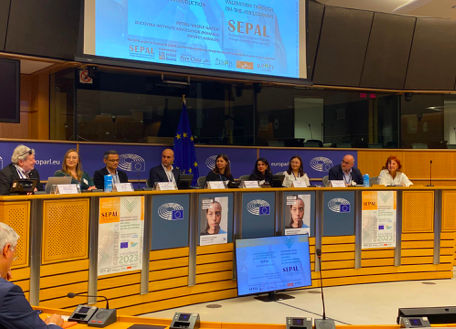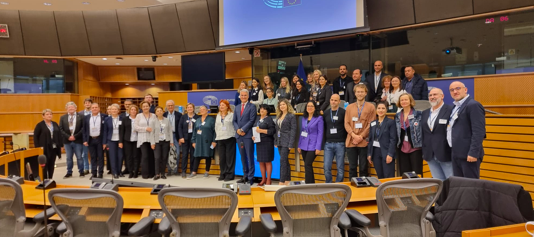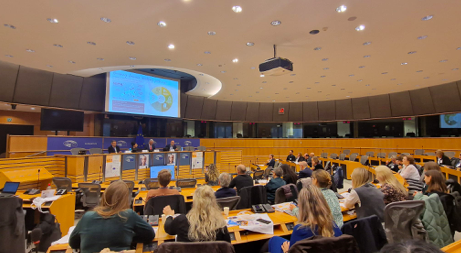The SEPAL Conference, marking a significant milestone in supporting youth NEETs in Europe, successfully took place at the European Parliament in Brussels on November 6, 2023, organized by the Bucovina Institute for Social Partnership Association. Under the auspices of the European Year of Skills 2023, the event brought together experts, European decision-makers, and representatives of partner organisations within the SEPAL project, hosted by MEP Dragoș Pîslaru, also President of the Employment, Social Affairs, and Inclusion Committee of the European Commission.

The event held at the European Parliament served as a focal point for discussions centred on supporting youth NEETs and their integration into the labour market. It not only united voices from various fields but also acted as a catalyst for concrete changes. Special attention was given to the development and validation of skills, as well as the need for workplace learning programs through paid internships and apprenticeships, reinforcing the commitment to building a society that promotes not only equal opportunities but also appropriate support for every community member.
The SEPAL Conference brought together over 50 participants from 28 organizations and institutions from countries such as Romania, Spain, Greece, Lithuania, Poland, Portugal, Latvia, Norway, Belgium, and Italy. Among the participants were representatives of the European Parliament and the European Commission. The event saw the presence of experts in education, vocational training, social enterprises, and youth employment, creating a conducive framework for the exchange of experiences and the development of innovative strategies.
Special guests who spoke during the conference included Dragoș Pîslaru, the event host and Member of the European Parliament for the Renew Europe Group, co-chair of Reper, and President of the Employment, Social Affairs, and Inclusion Committee, addressing the priorities of the European Union for youth. Nora Mehsen, representing the EEA and Norway Grants Fund for Youth Employment, sector officer and program manager for transnational cooperation, equality, justice, and decent work at the European Free Trade Association (EFTA), introduced the Youth Employment Program, emphasizing the potential replication at the European level and the importance of workplace learning through paid internships for youth NEETs, Beatrice Biolcati Rinaldi from the European Commission (DG EMPL, Unit B3 – Vocational Education & Training Unit), presented Pact4Skills and EAfA (European Alliance for Apprenticeships), Bucovina Institute for Social Partnership Association being an active member of both initiatives. Grethe Haugoy, expert in lifelong learning, employment and inclusion, analysed the innovative SEPAL evidence-based model and the WISE concept (Work Integration Social Enterprise), while Joao Albuquerque, Member of the European Parliament and member of the Committee on Employment and Social Affairs (EMPL), emphasised the importance of paid apprenticeships, traineeships and internships for young people in Europe. Felicitas Kresimon, General Secretary of Social Firms Europe CEFEC, presented the resolution signed at the 37th Annual Social Firms Europe CEFEC Conference by delegates from 17 EU member countries, including the SEPAL consortium, addressed to the European Commission. This resolution calls for the creation of an Action Plan to facilitate the socio-professional inclusion of marginalized groups, such as youth NEETs, migrants, refugees, people with disabilities, and other disadvantaged groups in the EU labour market.
The partner organisations within the SEPAL project, namely the Bucovina Institute for Social Partnership Association from Romania, Fundació Privada Pere Closa from Spain, Žmogiškųjų išteklių stebėsenos ir plėtros biuras, VšĮ from Lithuania, KoiSPE Diadromes/ΚΟΙΣΠΕ Διαδρομές from Greece, and KOMES Fundacja from Poland, presented significant results achieved in the project. In their presentations, the five partners strongly emphasized the importance of collective efforts in creating an inclusive and supportive environment for vulnerable youth, having a sustainable impact on building a fair and inclusive society.
The conference conveyed a strong message from the President of the Bucovina Institute for Social Partnership Association – Lead Partner of the SEPAL Project, Mr. Petru-Vasile Gafiuc, advocating for a solidary Europe and universal access to workplace learning opportunities for youth NEETs. In light of the alarming increase in the number of youth NEETs in Europe, the urgent need for measures to prevent a significant rise in unemployment within this category was highlighted. Concrete proposals discussed at the event included promoting workplace learning, improving communication between educational institutions and employment offices, and providing funding for youth employment support services. The importance of investing in education, developing workplace skills, and supporting green initiatives was also emphasised. In this context, a specific call was made for the establishment of a European Fund dedicated to apprenticeship programs, flexible and adaptable to local conditions. Furthermore, active involvement of social enterprises in implementing apprenticeship programs, considering their existing resources and social purpose, was recommended.
The SEPAL project, spanning five years, stands as a poignant example of effective collaboration among five European organisations from Romania, Spain, Lithuania, Greece, and Poland. The obtained results include:
- 2,706 youth NEETs registered on the SEPAL platform.
- 870 youth NEETs receiving employment support services, with 464 accessing apprenticeships and learning on the job stages and 259 successfully securing employment.
- 5 WISE experts playing a significant role in supporting and guiding youth NEETs, making significant contributions to their personal and professional development.
- 30 mentors/coaches trained in three 5-day sessions in Poland, Spain, and Romania, strengthening the support network for youth NEETs.
- Over 50 local, regional, and national organizations and institutions from the five partner countries forming Local Stakeholders Committees, providing extensive support in their respective communities.
- The SEPAL platform designed to facilitate access for youth NEETs and specialists to useful services and resources.
- Resources such as the Evaluation Book, Apprenticeship Book, SEPAL White Book, SEPAL Coalition, Work-based Training Book, and Innovation Book developed to share best practices and support youth NEETs.
- Three academies for youth NEETs in collaboration with Social Firms Europe CEFEC in Romania, Lithuania, and Greece, highlighting the importance of social entrepreneurship in their development.
- Certification of approximately 300 NEETs in courses dedicated to improving digital and entrepreneurial skills.
- The use of virtual reality (VR) in providing employment support services, offering youth NEETs a realistic and practical experience in various fields.
- 10 youth NEETs receiving support to develop their own businesses, accessing funding opportunities from the European Social Fund (ESF).
- Creation of synergies between 25 projects funded by the EEA and Norwegian Grants Youth Employment Program and the exchange of best practices, organizing 10 online events and 3 face-to-face meetings under the series “Let’s NEET together!”.
These results demonstrate the commitment and positive impact of the project in transforming the lives of these young people, creating new opportunities and perspectives in today’s society.

The SEPAL Conference highlighted the importance of European collaboration in addressing social and employment issues. It was a highly significant event, bringing to the forefront the need to strengthen support for youth NEETs throughout Europe.
Alina Gafița (Adomnicăi), Communication Manager
SEPAL Project


